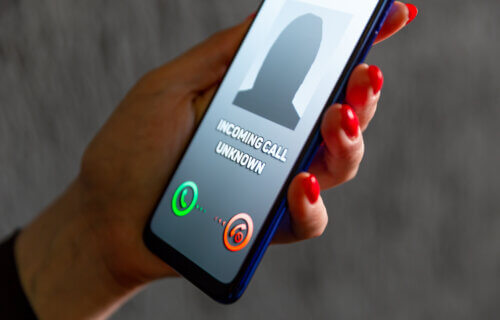SAN FRANCISCO — Smartphones have become a part of nearly everything we do in the digital age. From ordering food to entertainment to finding someone to date, our phones are in our hands or somewhere nearby all the time. Unfortunately, there are plenty of bad seeds out there that know this and are looking to exploit this digital dependency. One of the most unnerving trends out there is online stalking.
While it’s safe to say no one is openly trying to have someone stalk them, one tech expert says many people are making critical mistakes that leave them open to stalking. Increditools contributor Alan Taylor tells StudyFinds that there are six key mistakes people make with their smartphones, which leave them vulnerable to online stalkers.
Taylor has been a technology writer, testing and reviewing software for over a decade. Increditools tests and reviews the latest software, with a focus on transparency and constructive criticism about tech products. Let’s take a look at the problems they discovered and see how you can protect yourself from being a victim of unwanted cyber attention:
Mistake #1: Location Sharing
Taylor says many smartphone users overlook how often they’re sharing their physical location with the public. They’re leaving location-sharing features active on social media platforms and unknowingly telling people where they are through geotagged photos and other location-tracking apps.
How To Fix It: Taylor recommends disabling location-sharing settings on your social media accounts and other apps. Also, don’t geotag the photos you take. Lastly, consider using a virtual private network (VPN) to mask your IP address. This will improve your anonymity on websites and apps.
Mistake #2: Weak Passwords
No, “qwerty” and “abc123” are not good ideas for passwords protecting your vital information. Taylor notes that many people still fail to use strong and unique passwords. This can compromise your smartphone’s security because smart stalkers can crack your password and gain access to your data and pics.
How To Fix It: Try using biometric authentication methods to protect your device. This includes using a fingerprint or facial recognition software to unlock your smartphone. Other helpful tricks include creating more complex passwords, which are harder to guess, and activating two-factor authentication. 2FA typically means the app or website you’re trying to access sends out a security code to your email or phone number. You’ll have to enter this PIN before the app opens.
Mistake #3: Using Unsecured Wi-Fi Connections
Have you ever been to a coffee shop or hotel that offered free Wi-Fi? That can be a costly decision. Taylor explains that connecting to an unsecured Wi-Fi network can potentially expose your smartphone to hackers. Stalkers can also intercept your data as it passes over the unprotected connection. Simply put, your stalker would learn about you because you’re granting them free access to your phone.
How To Fix It: Avoid connecting to Wi-Fi networks in public areas, like a coffee shop or other common areas that offer customers free internet access. Again, using VPNs or secure mobile hotspots can protect your sensitive data out in public.

Mistake #4: Ignoring Your Software Updates
No one likes when those annoying messages pop up, saying that your smartphone needs to restart to download the latest security features. It’s inconvenient and often time-consuming. However, ignoring the messages and saving them for another time can be dangerous to your security. Taylor says that neglecting software updates leaves smartphones vulnerable to known tech vulnerabilities and exploits. When these weaknesses in your phone aren’t fixed, stalkers can gain access to your phone through these openings.
How To Fix It: One simple fix is enabling your phone’s automatic software updates. You can also regularly check for updates in your free time.
Mistake #5: Sharing Private Information On Messaging Apps
Dating apps are all about getting to know people, right? Well, sharing too much about yourself online can also compromise your safety and security. Taylor warns that online stalkers can use the information you’re giving them as blackmail material later on.
How To Fix It: Be careful about the type of personal information you’re sharing with people over messaging apps. Make sure you trust the person you’re talking to 100 percent. If something is truly private or sensitive, it’s better to discuss it in person. Taylor notes that you can also encrypt sensitive files and documents that are saved on your smartphone.
Mistake #6: Ignoring Your Privacy Settings On Social Media
No one likes reading the fine print, but failing to review and adjust privacy settings on your social media accounts could lead to unwanted stalking. Without adjusting the settings the way you want them, you’re allowing strangers to see posts you make without restrictions.
How To Fix It: Review and adjust your privacy settings right away. Taylor also recommends using privacy-focused apps and services that advertise their commitment to user data protection.
“Privacy is a fundamental right that must be preserved in today’s interconnected world. By empowering individuals with knowledge and practical tools, we can build a safer and more privacy-respecting digital environment for all, and protect ourselves from malicious actors,” the tech expert adds in a statement to StudyFinds.
